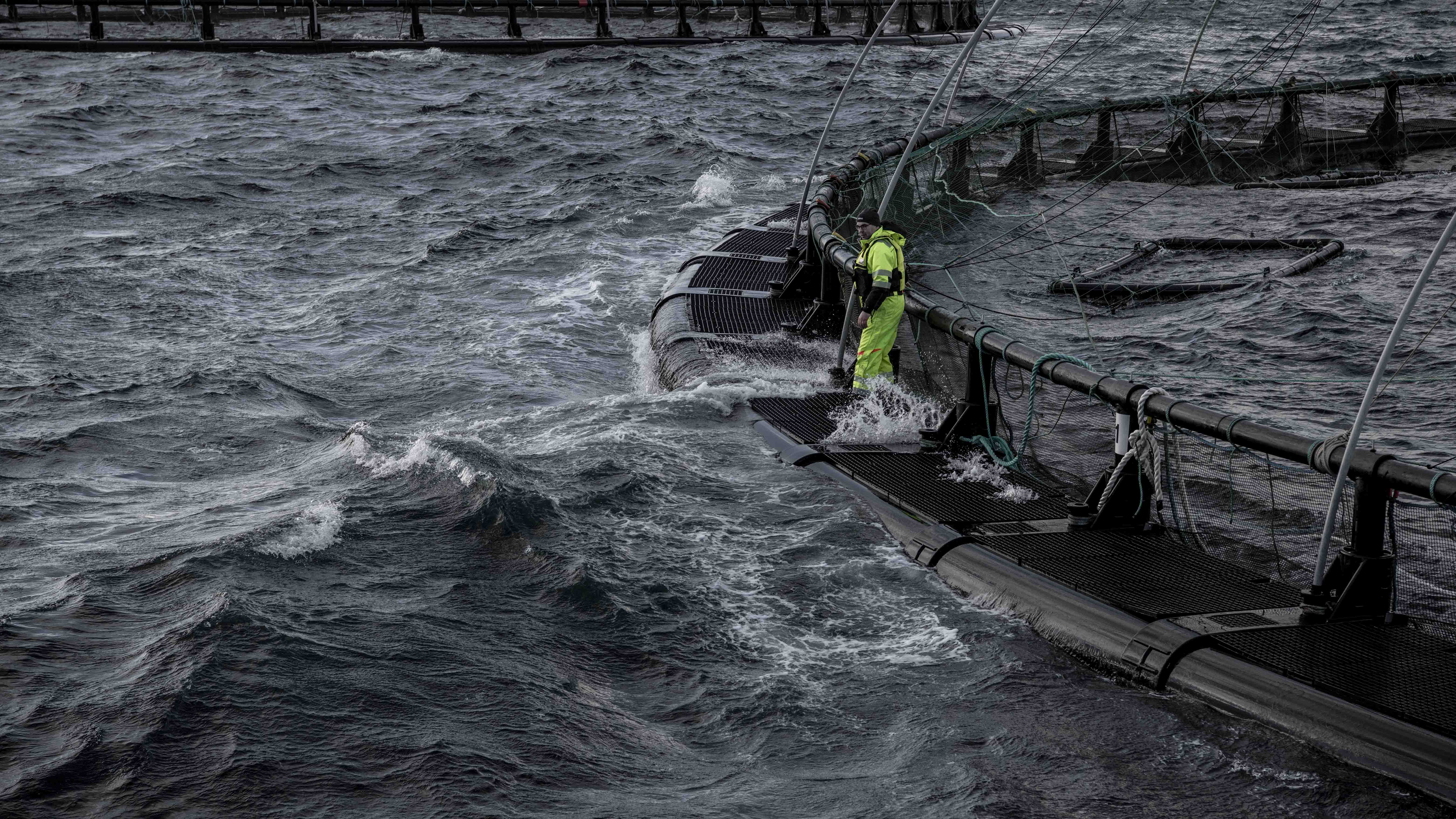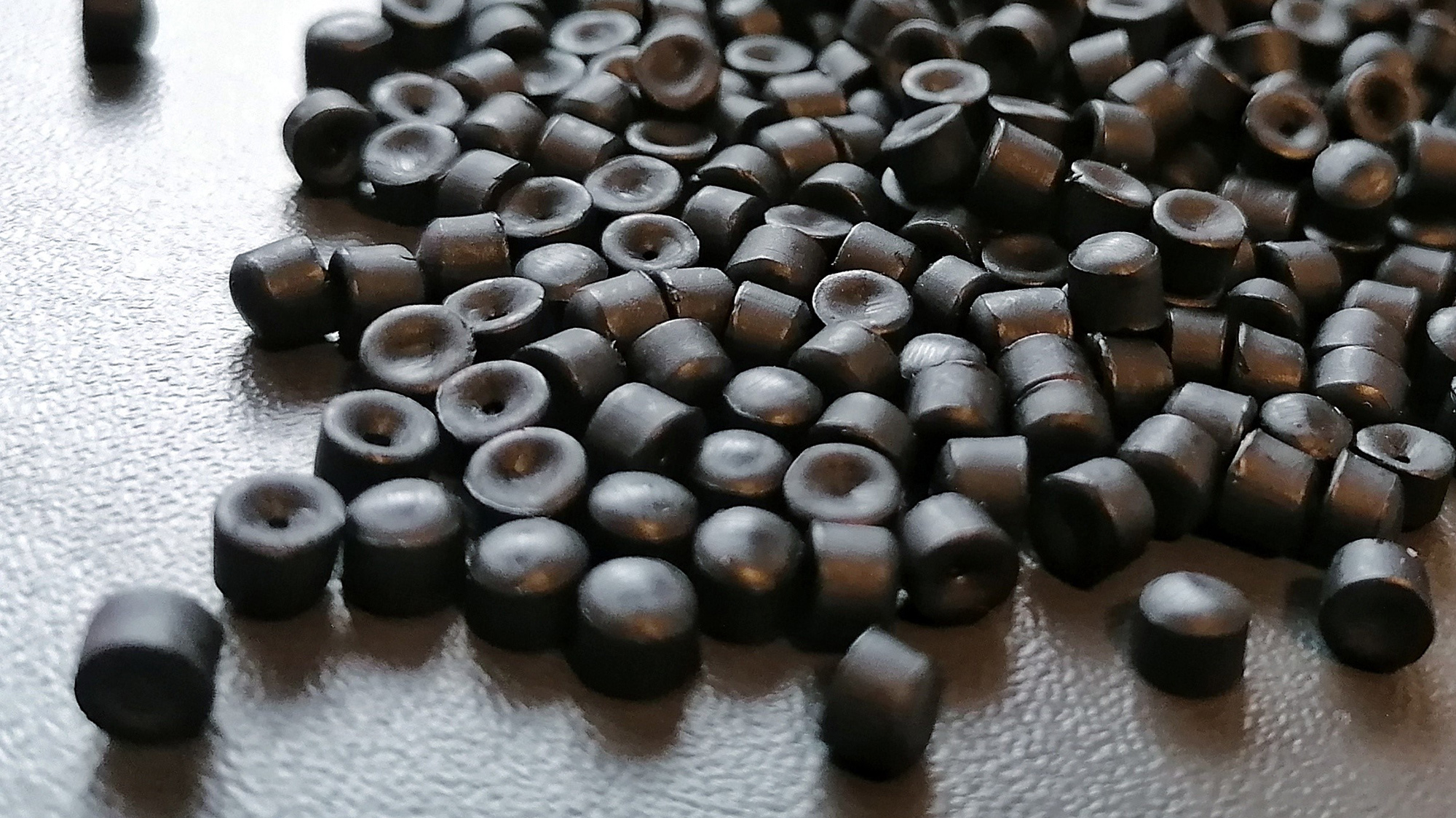
One of AKVA group's goals toward a sustainable future is to reduce the greenhouse gas footprint in the aquaculture industry. Waste estimates show that waste from the Norwegian aquaculture industry generated about 16.000–29.000 tons of plastic per year[1]. The plastic resources are reused or collected and recycled. Potential climate savings from national management of plastic waste from aquaculture is up to 50 million kilograms of CO2 by preventing, among other things, the incineration and export of resources.
Authors: Trude Olafsen & Dag Ove Antonsen
Aquaculture is so dependent on our natural resources of clean waters and healthy environment. Leading the development towards a more sustainable use of materials is a responsibility that we must take. AKVA group is the largest supplier of equipment to the aquaculture industry as such we should also be leading this development.
Sustainable solution with recycled plastic pen
A pen consists of high-quality polyethylene and both the product, and the material components are suitable for recycling and the establishment of national value chains with low emissions. Together with partners, AKVA group aims to develop sustainable cage solutions and works intensively with various projects to achieve this. Pens based on recycled granules from discarded pens are in the start-up phase and for which the partners in the project have high expectations.
AKVA group will, together with Plasto and Oceanize, break the barriers to using recycled plastic in fish farms. The entire pen will now be composed of recycled materials in a development project that has just been allocated funds from the Norwegian Retailer´s Environment Fund1.
The Norwegian Retailer's Environment Fund supports environmental projects that, amongst other things, increase the use of recycled plastic resources. The Fund has this year chosen to support AKVA Group's project, which entails the creation of a Norwegian circular value chain for pen production.
AKVA group´s strategy is to make pens more sustainable overall, and this has been going on for some time now. The company has invested in a RnD project called Megamould2 together with Plasto and SINTEF to bring forward a greater understanding of how recycled materials weathers and degrades compared to virgin polymer materials. The results show that it is very important to control the material quality before recycled material can be used.
This new project is taking development of pens entirely based on recycled material to a new level and AKVA group and the partners main goal is to introduce the new pen in the market in 1 to 2 years from now.
The path to a complete and sustainable pen solution
Due to requirements for material quality that are regulated by a technical standard (NS 9415:2021), mainly virgin plastic is used in load-bearing structures in the pens. The project will challenge the standard, not by changing the requirements, but by proving that recycled plastic from a discarded aquaculture facility has the qualities to meet the requirements.
AKVA group has already used recycled plastic on the walkways in the pen, but this project will make it possible to produce the entire pen based on recycled plastic from discarded pens.
Oceanize has extensive experience in collecting and recycling plastic from aquaculture and today delivers a carefully tested high-quality plastic granulate. The project is a major circular economic milestone. Now we get the opportunity to show the qualities of our plastic granulate. At the same time, complete solutions like these are central in a sustainability perspective.

Plastic granulate.
Pens today are not a big litter problem, but there is a great potential for using plastic in new pens. In this project we will achieve short, national value chains as the project participants are all established in Norway.
AKVA group produces the pens in Mo i Rana, Oceanize collects pens along the entire coast and has its granulation factory in Rørvik, and Plasto produces parts for the pens in Åndalsnes. The basis for an efficient and national value chain is in place. In addition, AKVA group will be able to spread knowledge to other fish farming nations where they sell plastic pens.
Several benefits of pens without polystyrene
Some time ago, AKVA group launched a new flagship pen – the 500R and 500RS series. In addition to its large capacity, this had an innovative solution with waterproof bulkheads as a replacement for the traditional solution with polystyrene in the floating pipes. We have taken an extra step and will produce all new pens without polystyrene. It is replaced by sectioning the floating pipes in waterproof chambers. The pens consist of almost 100 per cent HDPE material (high-density polyethene).
The quality is very good, and the product is more sustainable. The requirement for residual buoyancy in the event of pipe rupture is maintained, in the same way as the old solution with polystyrene. Waterproof chambers can in some cases increase safety in the event of an accident.
By cutting the use of polystyrene in pens, you also cut all emissions related to transport by car from the manufacturer to the installation site. From a sustainability perspective, it is important to reduce transport, and transport of polystyrene is particularly unfavorable because the product has a very low density. A fully loaded semi-trailer that can normally carry 30 tonnes, carries only about 2.5 tonnes when it is fully loaded with polystyrene.
All manual treatment of polystyrene from place to place is also problematic. It is inevitable that pieces of polystyrene are lost in the process when traveling all the way from the manufacturer, via transport to the installation site, intermediate storage at the factory or assembly site, installation of polystyrene in floating pipes, and last but not least when disassembling old pens.
Walkways in recycled material
In 2021, AKVA group received a request from Grieg Seafood Rogaland (based on input from Bellona) to develop walkways on the cages based on recycled plastic from discarded cages. Together with Plasto, AKVA group developed a solution based on the results from the research project Megamould.
AKVA group and Plasto developed a solution where recycled plastic maintains good enough quality. Plasto has now developed a process that ensures a stable raw material so that they can guarantee that the products maintain the right quality. They accept finished processed granules and produce new products for AKVA group, which takes it to the end-user. In the future, all walkways that Plasto deliver are produced from this material. As they qualify the processes, more products will come. This is a market Plasto already serve. They do not expect any growth in the first instance, but this helps to halve their footprint within this value chain. Then they make sure that the knowledge and technology they have will open up other market areas that can give them more sustainable growth.
[1] SINTEF Open: Avfallshåndtering fra sjøbasert havbruk (unit.no)
Do you have more questions? Contact:
R&D Global Solution Manager Trude Olafsen+ 47 91 55 74 00
R&D Senior Engineer Dag Ove Antonsen +47 99 73 83 55